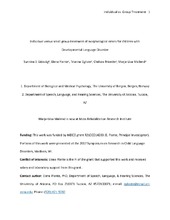Individual Versus Small Group Treatment of Morphological Errors for Children With Developmental Language Disorder
Peer reviewed, Journal article
Accepted version
Permanent lenke
https://hdl.handle.net/1956/23660Utgivelsesdato
2019Metadata
Vis full innførselSamlinger
Originalversjon
https://doi.org/10.1044/2018_lshss-18-0033Sammendrag
Purpose: This study examines the effects of enhanced conversational recast for treating morphological errors in preschoolers with developmental language disorder. The study assesses the effectiveness of this treatment in an individual or group (n = 2) setting and the possible benefits of exposing a child to his or her partner's treatment target in addition to his or her own. Method: Twenty children were assigned to either an individual (n = 10) or group (n = 10, 2 per group) condition. Each child received treatment for 1 morpheme (the target morpheme) for approximately 5 weeks. Children in the group condition had a different target from their treatment partner. Pretreatment and end treatment probes were used to compare correct usage of the target morpheme and a control morpheme. For children in the group condition, the correct usage of their treatment partner's target morpheme was also examined. Results: Significant treatment effects occurred for both treatment conditions only for morphemes treated directly (target morpheme). There was no statistically significant difference between the treatment conditions at the end of treatment or at follow-up. Children receiving group treatment did not demonstrate significant gains in producing their partner's target despite hearing the target modeled during treatment. Conclusions: This study provides the evidence base for enhanced conversational recast treatment in a small group setting, a treatment used frequently in school settings. Results indicate the importance of either attention to the recast or expressive practice (or both) to produce gains with this treatment.
